#nothing of value to say is me being charitable
Explore tagged Tumblr posts
Text
Her gaze tracked the blur of sequins and shrill laughter as the woman darted off, unapologetically cutting through the air like a bad scent in an otherwise perfectly curated room. Serafina didn’t flinch, but the lift of her brow said enough. “Unfortunately,” she murmured, voice satin-smooth with a hint of dry amusement, “yes. I think we’re in for a few more performances tonight. Must be the side effect of bad champagne.” There was something quietly fascinating about Levi. The way he stood a breath away from the usual chaos of the Pentavita, carved from the same stone but weathered in a different pattern. Less polished. More pragmatic. And in a room full of glossy masks and whispered schemes, it was... a relief.
She took a sip of her drink, letting it settle before responding. “I’ve grown accustomed to these events over the years,” Serafina said, her tone conversational but not careless. “My mother made it a point to have me attend them from the age of twelve. First by her side, then under the eyes of some chaperone or another. By sixteen, I was attending alone with instructions to ‘observe, report, and don’t embarrass us.’” She smiled faintly, though it didn’t reach her eyes. “It was all part of the training.” Her fingers traced the stem of her glass absently, a motion born of habit, of memory. “You learn a lot about people when you’re expected to be silent and decorative. Who talks too much. Who drinks too fast. Who arrives to be seen and who watches from the shadows. Eventually, you start to enjoy it for what it is. Not the glitter, but the game.” she paused for a moment, then added, "Though I do enjoy a good designer dress and well-placed make-up."
She glanced over at him then, the steel in her spine softened by a quiet kind of honesty. “I understand your hesitance. These rooms are loud in all the wrong ways. And your instincts about the money?” She gave a small, measured nod. “You're right not to trust it. There’s always another mask beneath the one we’re shown. This... charitable display is just smoke for something uglier.” The words sat between them like an open file. Nothing incriminating, but enough to say I see it too.
“Still,” she added with a shrug that made her gown shimmer, “some faces have to be here. Some titles require it. I'm sure those who count appreciate that you came.”
Her gaze met his again, calm and steady. “There’s value in being the one who isn’t like the others. Just don’t let them forget that.”

“cheers to that i suppose.” levi says as he glances at serfina. he was never much of someone that drank when he was younger. he’d have one or two glasses of something the most while he was out, but he was always someone that would rather be on his toes in any given situation than let alcohol alter his vision. “i might have something later, but perhaps i should not be seen drinking this early in the night when there are other pentavita members around.” he adds simply with a shrug as he glances towards the senators mixing and mingling with each other. he thought that they were doing a better job at getting to play the chess board tonight rather than any of the other people that were here because they had to be tonight. “the gala didn’t even say what this money was for, no one even knows whose family of this poor late mayor. It seems all too much like a mask for something bigger. i’m not trusting my money in that pit. my employees have worked too hard for that money to not be put towards a good cause that isn’t explicitly stated.” he says a bit turthfully with a shrug as he steps back as the woman in the sequin dress invades their space, his hands were deep in his pockets. the girl screeches about something else and runs off in the opposite direction. he blinks a bit as he glances over at serafina. “do you think people will be acting like that all night?” he asks, still flabbergasted by that outburst. It is like people forget how to move in a crowded room or in the city these days. One of his biggest pet peeves. “another reason why i don’t really care for these galas, but i suppose i should show my face here.” he says calmly as he glances over at serafina. “do you go to many of these things? It has been a moment since i’ve gone to a large gathering like this. I didn’t think it was customary to act barbaric like that.”
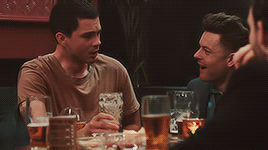
#Convo : sera x Levi#Yess of course I love you still <3#I am mildly obsessed with levi tbh#he can do no wrong
23 notes
·
View notes
Text
"Vote blue no matter what" posts would be more tolerable if they didn't tend to also include "and never criticise blue for anything, not even for supporting literal genocide".
As it is, I think it's quite logical that people who think genocide is bad, look at posts telling them it's wrong to say "supporting genocide is bad", and conclude the people writing those posts having nothing of value to say.
#nothing of value to say is me being charitable#if i wanted to be uncharitable id say#anyone who genuinely believes it's wrong to criticise or dislike a politician for supporting genocide#is morally bankrupt tbh#and like if u think bidens better on the genocide front than trump would be (which i think is a fair belief)#u can say that without whitewashing bidens crimes
11 notes
·
View notes
Note
I'm sorry that the terfs made their way onto your blog but it does feel good to see you support trans people. Thank you for that
Always.
I think, charitably, that the discourse going down on that post is an extrapolation and over-focus on one element of the point I was making: that for me, determining with certainty that I was cis was a rather fraught process. I was presented with many alternatives, but underlying their imposition on me was the oddly regressive idea that the things I liked, the principles I valued, the parts of myself I was proud of were not permitted of women. My whole life I got smacked with the background radiation that I couldn't like being strong because women aren't allowed to be stronger than men. I couldn't like being loud and boistrous because women aren't allowed to take up space. I couldn't be a math geek because women aren't smart. It was all deeply regressive misogyny from day one, but I started getting hit with it slathered in a fresh coat of paint - all those assumptions still held to be true, but now there was the out that I could do all those things if I just wasn't a woman.
Concluding that the underlying bioessentialist premise was wrong was very important. Absolutely none of those statements were true, and were only ever maintained by cultural saturation, goalpost-readjustment when they were actively disproven, and the occasional bout of lying with statistics to pretend they weren't just Shit All The Way Down. The core premise that certain things were only permitted of or possible for men was bullshit, and I didn't need to surrender the gender I liked best in order to play in the spaces I wanted to. I could simply exist the way I was already existing. I didn't need anything else.
The misinterpretation is the assumption that this being true of me means this is everybody's relationship with gender. I turned out to be cis, so for me, feeling that holding onto my assigned gender wasn't allowed was distressing - just another invocation of the same bioessentialist bullshit I'd been dealing with since the preschool playground. This is because misgendering is fundamentally denying that a person has the right to express themself the way they want. When aimed at me, it says I'm not performing traditional femininity well enough to deserve my pronouns. The same disrespect is the root of misgendering when aimed at trans people. "Perform your gender to my satisfaction or I will confiscate it."
The problem is, bioessentialism is 100% ingrained into the terf playbook, which is why, for instance, all their shitty talking points about trans athletes eventually boil down to "no woman can ever defeat a man in any contest because we are simply naturally weak and stupid and there is nothing we can do about it" and quite frankly nothing disgusts me more than the defeatist acceptance of the very lie that feminism is dedicated to overcoming. Instead of accepting that the paradigm of bioessentialism is a false dichotomy right from the jump, they embrace and weaponize it against the people whose existence proves the dichotomy is a lie. If gender essentialism is fundamentally false, then it is nobody's fucking business what anybody does with their gender. If the lines don't exist, nobody needs to enforce them. And yet there the terfs go, hunting down people whose lives are none of their business and trying to argue that they represent some great and terrible evil, some downfall of society made flesh, something that makes it totally correct and normal for them to spend so much time thinking about strangers' genitalia. They want this to be a noble crusade so badly they won't even examine what flag they're flying.
I love and support the trans people in my life and will always, always stand on the side of your right to exist, but alongside that, terf rhetoric especially disgusts and infuriates me because it is, at its heart, utter cowardice. The world told them they were weak and stupid and inferior and they fucking believed it. And now they think Fighting The Good Fight For Women means turning around and using the same paradigmatic weapon that hurt them to hurt the people whose existence outside the binary proves the weapon is a lie. They're the same shithead schoolyard bullies who made me believe my entire existence was foundationally wrong for years of my life and I will never, ever side with them or the shitty, cowardly rhetoric that contributed to the loneliest years of my life.
Figure out who you are and do it on purpose. Find the real source of the misery in your life and try fighting that instead of the other crabs in the bucket. Trans rights.
2K notes
·
View notes
Text
I’m thinking. A dangerous pastime, I know, but I’ve been reminded yet again at how fandom “fixes” characters to fit into their own sensibilities, and I realized a parallel.
DISCLAIMER: this is not an academic paper, I wrote this in one sitting after a day of eating nothing but cookies. Too long to read? The gist is that society is very fucking uncomfortable with accepting people for how they actually are outside of predetermined roles, and so they try to rework people’s images to be more palatable at the expense of authenticity... and this applies to how we treat characters in fandom.
I will never stop being upset at fandom for girlbossifying Mina Harker: for denying her flaws, values, weaknesses, and even some of her strengths because they don’t identify with those, and they have to rework her in order to even halfway tolerate her as a character. AND THEN THEY CLAIM TO LOVE HER. And it just made me think “how can they claim to love her if they hate everything about her?” And I realized that a lot of the people who talk up Mina and build her up as a paragon of girlbossery ignore and/or devalue her words while mythologizing her actions. Like “this is the woman who did this this and this, she’s a girlboss feminist queen” while conveniently leaving out her perspective on the matter.
So many people like to reframe her tangent about how silly and gauche she views New Women as her being sarcastic or ironic. “It’s just a joke! She actually thinks feminism is great!” they say. But she is not a sarcastic or ironic person. She’s very witty, but she’s not snarky or irreverent. This is a case of people projecting traits onto her that they like while erasing the ones she actually displays. They like their women to be disingenuous and wisecracking because insincerity is a way of taking control, but Mina is earnest and honest about her beliefs and feelings, and they don’t like that because honesty is a form of emotional vulnerability, and a woman being emotionally vulnerable is “playing into the stereotypes”.
Now, what’s the parallel?
It made me think of how Seward views Jonathan after reading his journal in the novel. Jonathan was so honest about his fear and uncertainty in his journal that a wide-sweeping interpretation of that part of the novel in academic spaces is that Jonathan was just a yellow-bellied coward. Seward does not have this interpretation at all, in fact, he is shocked to meet Jonathan because he had been picturing a mythic figure of perfect chiselled masculinity like Hercules! And instead he is met with a quiet, mild-mannered solicitor?
Why does Seward make this mistake? We all joke that it’s because he’s not incredibly bright, which he isn’t, and he’s super gay, which he is — but the crux of it is that he is not receptive to the idea of people who don’t fit into his worldview. He is very particular about how he believes men and women behave. Men are rock solid and strong both physically and mentally whereas women are as delicate as cotton candy. He meets Mina and decides that she must be the ideal woman. So, he simply ignores all the ways her husband doesn’t conform with his ideal man. Jonathan being bedridden from mental trauma he faced in the castle? Psh. Might as well have never happened. But we all know that, had he met Jonathan before his recovery, his impression would have been way less charitable. Why? Because we all know that, as Mina gets sick and Seward is primed by an authority figure to distrust her intentions, things he admired about her (like her acts of service) get reframed as potentially nefarious.
It is so easy to ignore everything that is true about a person and frame your perception of them in a completely dishonest way because that’s just the most comfortable option!
Seward fails to acknowledge the ways that Jonathan subverts his expectations because the people who don’t fit into his expectations are, to him, the dregs of society: people who belong in his asylum or in the ground. So, he juices up Jonathan. He’s like “he must be the most ripped flawless guy ever” because his brain doesn’t have much room for nuance. He’s uncomfortable with accepting that the men in his life who he idolizes aren’t paragons. He’s stiff and awkward while comforting his dear friend who just suffered the deaths of his father, his would-be mother-in-law, and his fiancée in such a short amount of time, only offering a stiff embrace with a couple back-pats and some words of affirmation thrown in and justifying that with “that’s all the comfort a man needs”. And hey, it’s not like he despises his friend for being able to cry, it’s that men have never really been taught how to reckon with their emotions. They see a woman being emotional, and shrug it off and say “psh typical hysterical woman”, but they see their fellow man struggling, and the only response they have is “hey… stop that. You clearly aren’t having a good time, and I don’t enjoy this either, so you should just… stop feeling and save us the trouble?”
Likewise, people don’t want to acknowledge Mina’s internalized misogyny and deep self-hatred because they’re not comfortable with women having flaws. And hey, this is a VERY complex issue. It’s uncharitable to say it’s simply woman-hating. For women who have this way of treating female characters, it’s born from their identity as women and how they are expected to navigate the world. They see a woman who is anything less than a pure goddess and get upset because she’s supposedly making a fool of herself and bringing dishonour to them by association. “You’re setting a bad example for the rest of us! There is limited space for women in fiction/the workplace/the public eye, and you’re taking up space and fucking it up! Now everyone will think that women are emotional/stupid/slutty!” And for the men… they’re literally just the Van Helsings and the Sewards of the world. Either a woman is the perfect wife or she’s a voluptuous she-beast, and whichever one she is justifies how they treat her, and that solidifies their place in the world as men.
My ultimate point is that we all acknowledge how silly it was when Seward got it in his head that Jonathan had to be a jock to have survived the things he did, and yet we let fandom treat Mina the exact same way?
#dracula#mina harker#john seward#jonathan harker#character analysis#gender shit#I don't know what else to tag#rant#probably
45 notes
·
View notes
Text
Transformers Skybound #19 and #20 spoilers below cut
ISSUE #19
I was going to talk about issue #19 last month, but what do you know? I had literally nothing of value to add, especially since I'm behind on Void Rivals (sorry, Kirkman) so I know shit about Quintessons in this continuity. Anyway, this story reads more like an intermission; not that this is bad, but there's nothing really meaty here. Well, I guess I have SOME thoughts, soooo.... Bullet point format...?
Ooooh yeah, the trait of Megatron having the need to have the upper hand even in situations where he is at another being's mercy is actually one of my favorite things about him (Movie.) I can't be the only person who thinks Megatron's autopreservation and fear (eh) of being controlled are actually important to his character, right? I'm a "Megatron was built by the Constructicons" believer, so take that as you will.
Evil Matrix of Control (that's the tyranny) AND good Matrix of Freedom ("freedom is the right of all YOU KNOW HOW THIS GOES).
Tank Megatron :(
Megatron loving his planet? Yessir!
Symbolic representation of forced suicide. Whatevs.
Isn't it ironic how Megatron gained his ability to control others through the loss of his own bodily autonomy and against his own volition? He's like, a tool, a tool you wieeeeld???? Yeah.
That was fun. (he says, with a blank look of indifference in his face.)
ISSUE #20
Ok, the one people are actually talking about.

You get your ass kicked for ten minutes and are already asking for him to kill you?? I could be charitable and pretend this is character writing, but like, no.
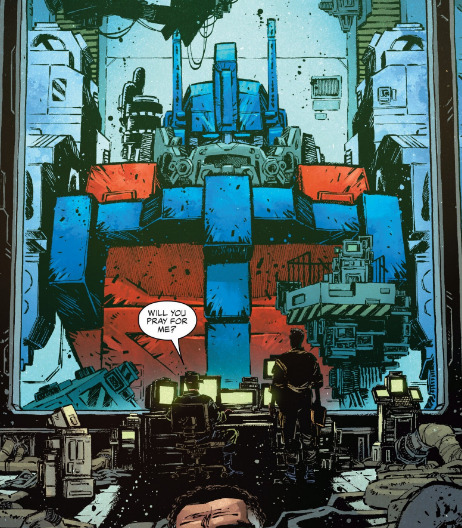
"WILL YOU PRAY FOR MEEEE WHEN I'M GOOOONE?? OR IS THIS THE ETERNAL DARK WITHOUT A DAAAAAWN?!"
Uh, I mean.
Wow, a Cybertronian getting captured by a human facility? Feeling bold today, aren't we?
Ok, jk jk, I really want to see Mags' PTSD explored. Hopefully.

JAZZ BACKSHOTS 🙌🙌🙌🙌
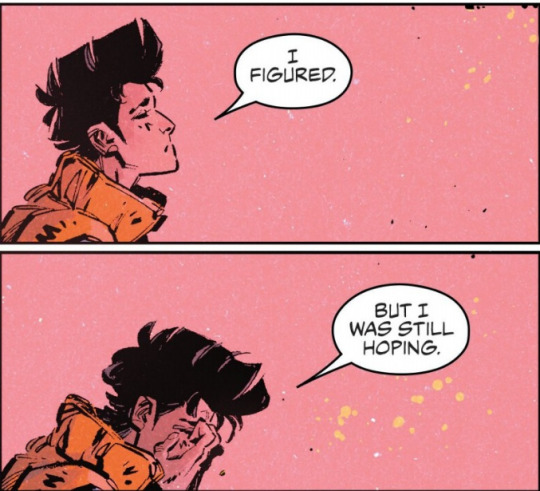
I liked this scene. I liked how DWJ didn't forget about the grief Spike must've been feeling. Or the grief he didn't have time to feel due to the... Giant robots.

I like Skybound Optimus. And I like how, despite being THAT guy, he still has moments of vulnerability and doubt (lots of it, actually).
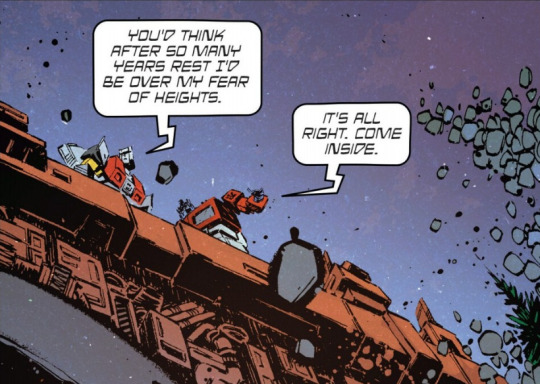
Looks like someone was reading the tech specs/biographies before writing.
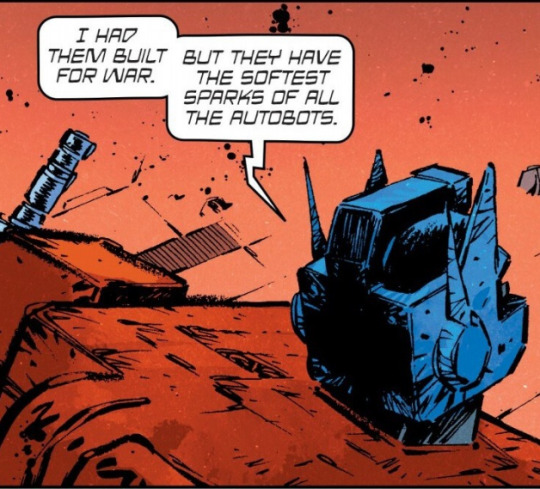
Brooooo, you can't just say that. Now we know they have a target on their backs.

Dada. Papa. Pops. Dad. Father.
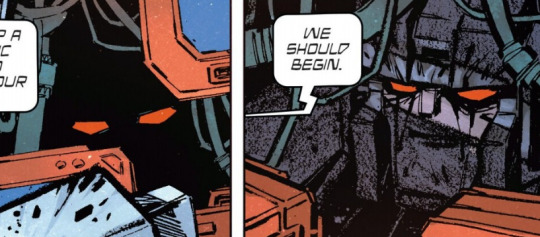
Foreshadowing.... In the shadows! Wow.
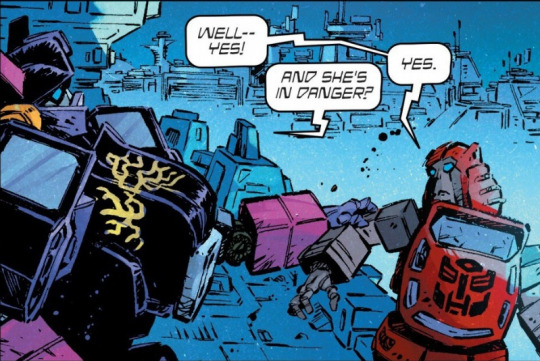
Ohhh, we're gonna have an E.T. scene, right? Carly meets her old van, and Shredhead meets her. Bridge between Cybertronians and humans. (That's my pitch.)
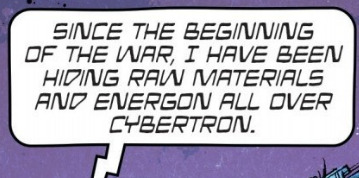
Very convenient.
Did he bring Scavenger along too? Like, yk, Microbots. That's my HC.
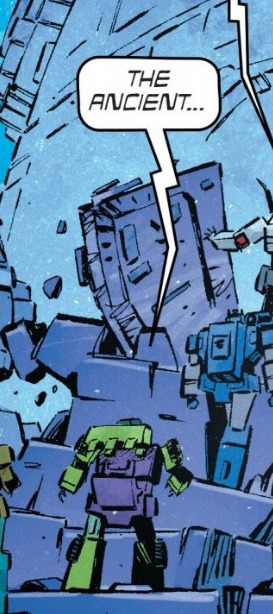
SCRAPPER HAS A LINE OF DIALOGUE. WE WON. WE WON!!!
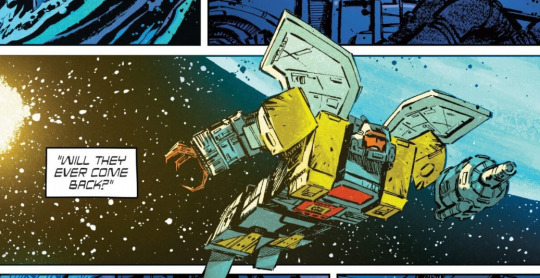
Foreshadowing or just a throwaway line? Place your bets.
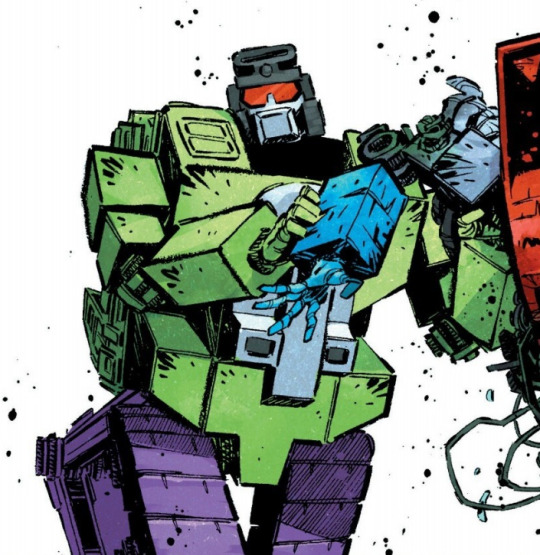
Dude, you're adorable.
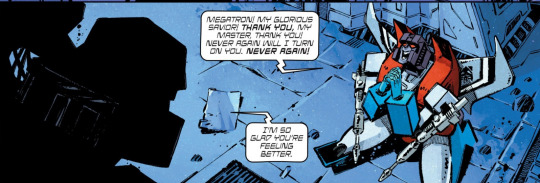
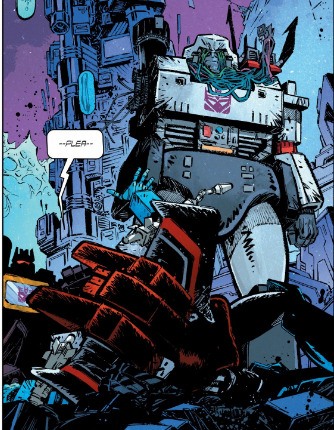
I haven't said this because I'm busy joshing around, but I really like this Megatron. He's very different from other incarnations of him, and I'm all for it. He's cold and calculating, but he clearly has a code of honor and actually cares for his subjects. I like him.
Also, one more Starscream abuse scene for the franchise.

they faces killing me why nobody gaf

Despite not being into this Starscream or his dynamic with Megatron. I can say that in the context of this universe and this issue, this scene was very well done and honestly kind of gut-wrenching.
I'm a little bit worried about Starscream's character from now on. Will he just dissipate into the background? 'Cause there's clearly no space for their common G1 Sunbow bickering.
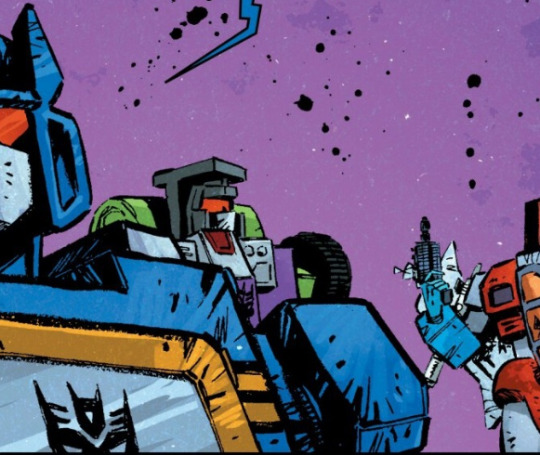
Scrapper (thinking): "Fuck... Did I remember to turn the oven off back at the base?"
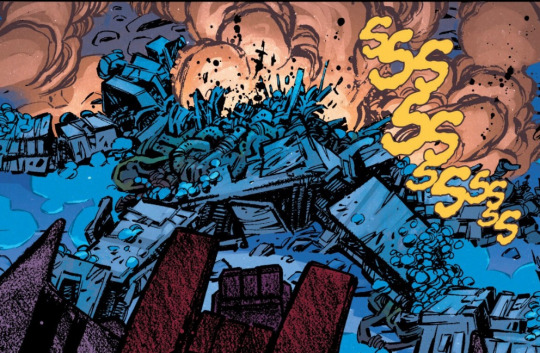

That's it?
DWJ has been building this shit up since issue fucking #8 for this cockblocking move? Not even a name drop? Like, I don't want to complain just so DWJ can pull the rug out from under my feet and make my chin DROP in the next few issues. But the only reaction I had from seeing this was a deeeeeep sigh of disappointment. Like, what a wet fart. I wouldn't mind it that much if he hadn't teased us for so long.
#transformers#maccadam#talkingtalkingtalking#transformers skybound#transformers skybound spoilers#this issue was kind of a dud#a dud with great moments but still#me and my constructic*n crumbs sounding like I've already lost my mind#like I'm pretty sure they'll make astrotrain's corpse into some fucked up ship or whatever like#they didn't just shoot this guy to death riiiiight???
30 notes
·
View notes
Note
Hi Celta,
Thank you for expressing how you truly feel about Camilla. I’m glad that she’s being revealed for the person she is.
I got into a disagreement with a tarot reader on here because I called out her bias against the Wales. Her opinion was that William and Catherine were destroying the monarchy because they’re lazy, don’t want to work, are on ego trips against the King, especially Catherine all of last year, and they don’t want to take on assignments as ordered (which I suspect has a lot to do with reconciling with Harry, and bringing him back into the fold). She wanted to nitpick every decision and ongoing project the Wales have, and every single one was baaaaaad and destructive. All of this amid the worst health crisis they are facing, I thought it was highly unfair.
I challenged her to look at Charles as POW and asked what HIS plans were for the monarchy at William’s age (42), when he was newly married to Diana. Besides playing hide the sausage with Camilla at her sisters estate, ruminating about plants and architecture, I’m not aware of what his long term plans for the monarchy were. His decisions about the Duchy of Cornwall I’m sure were based on solid financial advice given to him by the best advisors. He’s had the better part of fifty years for his Princes Trust and Duchy to gain value on the stock exchange. What were his future plans for continuation of the monarchy really?? She got angry with me, and instead of answering the question, she blocked me, and called me a Wales worshipper and being delusional about William and Catherine.
Here we are in 2025, Charles is King and things are falling apart. It seems to me no one was asking Charles the same hard questions being asked of William. There was no accountability then and throughout Charles’ life, yet some people ( I strongly suspect Sussex sugars) are turning the screws on William and demanding the accountability they never asked of Charles. All of this to say, if you can turn back time, can you look at Charles when he was William’s age now, and ask what were his plans for the long lived continuation of his line?? It seems that’s the point of the monarchy, and Charles seemed only into having the best time, and not on thoughts of future. The future has now arrived with a bang, and now Charles seemed only to be interested in status quo. If you fail to prepare, prepare to fail.
I wish only the very best for the Wales, they have their work cut out.
Hi AnonymousRetired,
I think my main gripe with Queen Camilla is that for me, she is not acting like a queen. All the gloating and self glorifying PR is not what a Queen does, at any time, in public, and neither is showing disrespect for the country's main religion, the one of which her husband is head. It's just wrong, and it rubs me the wrong way, and then I get blunt in my assessments as I'm too irritated to be charitable.
I know a lot of people like Queen Camilla, and I am glad that she has supporters. I don't blame people for liking her. I wish I could - I wish I still had the grudging respect that I had for her before she opened her mouth and showed what she was really like - but I can't, and that is all there is too it. I wish her supporters well but I can no longer be one of them.
Some royal watchers are biased against the Prince and Princess of Wales. I have noticed that. There is no point in arguing with them as they are not open to reason or logic in that area.
They have built up their own community and their place in that community by abusing and bullying The Prince and Princess of Wales, and they are not going to change now. Part of that abuse is holding one standard for the King and Queen that is filled with excuses for their behaviour, and another, much higher standard for The Prince and Princess of Wales, where everything they do is torn apart and criticised to the nth degree, especially if there was nothing wrong with it in the first place.
What those royal watchers say about others is what they are guilty of themselves - their comments are projections of their own behaviour.
I ignore them, as what they say is of no interest to me. IMO their comments are driven by dislike, if not hatred, and/or intense envy and jealousy, and I see no reason to engage with that.
Other royal watchers prefer to focus on The King and Queen, and that is fine. I have no issue with that at all. Everyone can follow their own interests on their own blog, and others can engage or not as they wish. There is always the option of scrolling by if you don't like what another person says.
As for accountability, that I think goes back to the media. They were fine letting King Charles do whatever he wanted and covering his activities in various ways, and the closer it got to the time King Charles would ascend the throne, the more flattering their coverage became. On the other hand, the media have a definite bias and against and, in some cases, hated for Prince William and Princess Catherine, because the two of them do not play the media's games, and the media takes it out on the couple in their coverage, including holding Prince William responsible for things that were never his responsibility in the first place and comparing him unfavourably to his father. Certain royal watchers have picked up on this trend and they follow it and apply it to everything done by Prince William and his wife.
Your arguments about comparing The King to his heir make very good points. My own preference is not to compare the two but to judge each one on their own merits. So far Prince William is winning in my eyes, but that could be my bias showing (every time I think King Charles has shown that he can be a good king he stuffs it up in some way, most recently by shoving Camilla down my throat).
30 notes
·
View notes
Note
Y'know say what you will about Shadow Generations, but at least Shadow's story is effectively a side thing that doesn't really intrude upon Gens' main one
So Shadow is still less sucked off than Alucard in NFCV. If Shadow Gens were like Nocturne it would start with Shadow saving the Sonics from the Time Eater and saying they should go help him against Black Doom
Different situations, maybe. Shadow Generations, regardless of its value as a game, was basically meant to be an ad for the upcoming Sonic movie, which all but promised us to hype Shadow beyond belief - we'll see soon if the movie will spam him or relegate him to maybe 10 collective minutes of screentime lol. The game itself, however? Yeah, it's just Shadow's side story meant to introduce him to the new audiences. It's all about how cool and awesome Shadow is that he doesn't care about his biology at all, no siree... but let's be honest, ShTH did more to suck him off lmao, remember the Last Story?
Regardless, I'm more charitable towards Shadow no matter what. Our hedgehog has been effectively dormant for a decade, save for a few minor appearances, allowing Sonic to do his thing unfettered until fans started to miss the "shitty friends" lol. I can handle one year (more concretely a few months) of nothing but hype and cheer for a character I'm not invested in. Alucard, however, has been stealing the Belmont show since 2017, and at this point it's getting ridiculous. Alucard was the main protagonist of S2, relegating Trevor and his family drama to comic relief. Alucard stole precious screentime in the crowded S3 despite his story being pure fluff. Alucard only existed in S4 because of fanservice, both in terms of the character and in terms of design (then again, do people even like N!Alucard past his tiddied design?). The writers clearly jumped from Dracula's Curse to Rondo of Blood/SoTN purely because that's when Alucard wakes up again in the games. S1 of Nocturne ends with Alucard Ex Machina because otherwise the new shiny heroes would have been killed by Isaac With Tits. The trailers for S2 have mainly featured Alucard. I'm so fucking tired.
"wah wah will you guys ever adapt Simon's story" no because they don't give a shit about anyone who isn't Sad McTits! Isaac was the only one who rivaled him in Creator's Petting, but by now he's dead, good riddance, we're stuck with the True Blorbo. It's one thing to suck Alucard's sparkly dick off, it's another when he keeps eclipsing every other character who at best is reduced to be his cheerleader (or some sort of half-baked homoerotic rival)! Why does he keep riding on the shoulders of other protagonists at this point?
And of course, this doesn't even touch on the fact that we're not talking about the real Alucard, who is still a character I can enjoy. This is Alucunt, the snobby snarky asshole who looks down on every Belmont. Save me.
19 notes
·
View notes
Note
Hello👋 I came here from your Maki-Angel AO3 fic. I really enjoyed reading your Makima analysis on here. It's always awesome seeing people reflect on her character. I'm also quite normal about her. I remember hating her on my first reading. But as time went on, her whole arc and existence resonated with me. What were your impressions after your first run through Part 1? Did you love her from the outset, or did it take time to build?
(Mentioned makiangel fic here! Give it a look maybe~)
This is like really long lol I recount my reading experience like a dramatic play. For the occasion it's now my Makima central post for talking about my personal thoughts on her and all, I also recommend some fics and fanart at the end.
Have my little Makima shrine that I look at with wistful sighs. I want the Yoyo studio bust of her so bad but it only comes as a purchase bonus for an expensive af figure. Also the zaohua figure but I'll keep dreaming
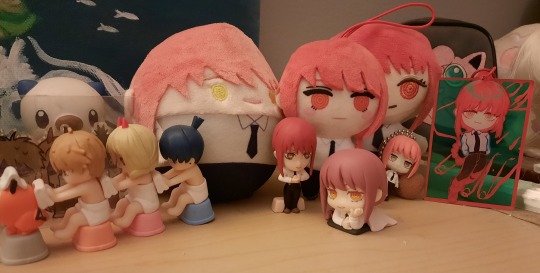
I actually may have the weirdest chainsaw man reading experience... I actually read Chainsaw Man part 1 FOR Makima. She was my fuel and my drive to keep reading, knowing more about her and what happened to her was the thing keeping me reading. At the time I didn't know fujimoto like that™️ yet so I didn't really have built up trust in his writing and I took everything at face value sort of. The humor, the shonen-ness of some of the story really wasn't for me, and as an ace I don't like putting sexuality and romance on a pedestral of importance, when it isn't done self-awarely.
I like to say about csm actually that it does this really interesting thing where it starts out making you suspend your disbelief about red flags. There's obviously something wrong about Makima from the very get-go, but it's not really like Aki and Power were nice healthy buddies for Denji at first either. Everyone introduces CSM as being this craaAAazyyYy series so sure, okay, a messy morally ambiguous cast à la Dorohedoro, love that! Her weirdass direct and smiling behavior had me intrigued scene 1.
And having a character be blatantly uncanny and ominous despite having done nothing much actually wrong yet is the best way to activate my charitability neurones... I was consciously dismissing the red flags listen I drunk the koolaid- it actually gave me this very interesting experience of being in denji's shoes about Makima. Early on I shipped Denji Makima and I clungggg to that hug in the first meeting, I clung to that warmth I clung to every bit of humanity she showed. I clung to it maybe being a underdog x underdog story, I thought... I thought she could have a redemption arc like Power and all, I thought Denji could fix Makima I thought he could complement her very cold practical mindset and ground her 😭😭 I cheered when she didn't die in the train, I cared about nothing else.
So obviously that did not go very well for me. When she died let me tell you I MOURNED Makima, I also had to mourn their relationship alongside her- it was really masterfully done of just pushing and pushing until it couldn't be denied in the slightest that the relationship was abusive, plain and simple, and that Makima wouldn't change. That the way Denji defeats her works because she never cared about him in the slightest at all- tough pill to swallow that crushed my soul, 10/10 unforgettable Fujimoto I trust you with my life now. But you know, I couldn't help myself from still loving her, for my heart still aching for her and wanting to see the humanity in her- Denji's sushi reaction about still loving your abuser rang so true. Makima feels like she was MY abusive partner 😂 So i see her as someone who couldn't be saved from herself, sort of. Denying to yourself that you crave connection and love never goes well. So in the end the thing about Nayuta and giving her the hugs Makima couldn't receive really comforts me a lot. You can't save makima, but you can do good in her memory, even if all she left you was empty adoration and hurt. Am the #1 hater of the "the control devil can only be evil" theory.
And then the next level of this is that for like a year I did not actually complete my read of Chainsaw Man. That's right, I dropped Chainsaw Man... It's only with part 2, which is much more my thing story wise, that I started reading again- still avoiding reading what I skipped in part 1. Last year I eventually did binge part 1, but I really had to prepare myself mentally for it for a long time first.
What was so bad I dropped you ask? Reze. Reze's debut. I'm not kidding lol, even now I still dislike Reze, sure it's some of what she did too but it was mostly what she represented, the tropes and plot progression she brought with her. Reze showed up and Denji started crushing on her, and immediately I knew where the story was going. Immediately I knew it wasn't going the Makima redemption route. Ah shit red flags real. You don't introduce a secondary love interest in a story like that like THAT without setting up themes of moving on and letting go and noooooo no I did NOT want to let go of Makima. So I skimmed ahead and my fears got confirmed and then I stopped. I wallowed. Then an hour later I go to the chainsaw man wikipage for Makima and spoil myself on everything. Oh she's the control devil? Checks out. Oh she wants to set her own world order and wants to have an authorotarian government? Yeah she would... Too true...... And then I did read the last chapter and I did grow a lot of appreciation for Fujimoto and the whole story. Ah shit it was about abuse all along and u played me like a fiddle. Sob. So when I say I mourned makima, -gestures-.
I stewed in my feelings for a long time and just sorta digested my emotions and thoughts and curled up in a ball on the floor rolling sobbing chanting her name in misery. My appreciation for Denji and Fujimoto's writing grew directly as my unconditional love for Makima wilted. I have a lot of love for Denji and a lot of respect for Fujimoto.
I tend to have a character reading style where I get my enjoyment and emotions from growing to understand and be attached to characters more than events happening and keeping action going. Sort of instead of "what happens next" my drive is "what happens TO THEM next". By latching onto bits of psychology I find interesting or promising that means i got really attached to Makima hard and fast. I knowww pass me the clown wig.
She does target a lot of my specific interests in characters though. My favorites things ate the undesirable and the dehumanized- and the control devil Makima plays into both (because her desirability is limited by her feeling uncanny and it being an instinctive red flag) but mostly the latter, hard. I love people having a hard time finding somewhere to belong, I love nonhuman characters willingly or nof craving being human, I love characters struggling with their humanity (even when they aren't human! But you can't outrun a desire for bonds and emotions), I love characters who don't know how to give or receive love. Even when characters are pure evil I will always attempt to humanize, even if it's just for the sake of understanding them onesidedly. Seeking the humanij thd inhuman is MY SHIT!! Esp as someone who gets dehumanized for not being born intuively understanding socialization, either. Part of her resonates with me, the afab autism vibe and demeanor, the scripted way she approaches socializing, the perfectionism to compensate, the rigidity and the self-preservation of denying she has feelings. If denjima was endgame it WOULD have been addictive to me, reading redemption arc longfics 1000 times. Well the reveal Denji is 16 did have me horrified but in a perfect world yk. But no instead makima is an exercice in things being tailored for me, yes being humanized in canon which considering her character ia frankly surprising, but being told very firmly "No, they can't get better". Don't get me wrong the angst is great and I love pain, but man, even with like Metal Sonic's chronix self-destructive obsession there are silver linings. So no instead i just get to read fics about her and her dogs chilling together with crumbs of happiness and make my peace that she's doomed, that this is doomed. She's tragic, that's what she is to me. Falls down a flight of stairs
I yearn for a world where I could love her unconditionally and the meta IS part of the angst for me. I watch this edit a lot:
youtube
Makima with Washing Machine Heart really does go unfathomably hard "I know who you pretend I am" not as 'you love another' but as 'you hold onto this version where I am nice instead of untrustworthy, as this idol as- Ughhh ugh ugh ugh ugh I love trying to understand her I love the slope of her eyes I love the way she emotes and moves and her petty or opiniated words whenever she lets herself intone I love whatever I can glean from her impersonal unfeeling brick wall persona, I love the person I pretend she is.
So yes I never hated Makima but she did hurt me a lot.
Recommendations time!!!
Slice of life Makima is a fic genre I really like, I have a couple of wips in store for that I might get around to too. Here are my Makima fics ao3 bookmarks:
Sanctum
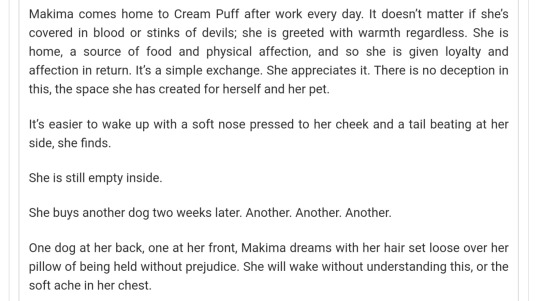
Girl Synanthrope

In this world, we walk on the roof of hell gazing at flowers
(No preview this time just read it)
I actually discovered makiangel on a binge of fics like this, with the tags Makima + character study on I think, with Terrible Fish which I also really recommend. I love exploring characters and making them have arcs specifically through relationships they have a lot, which leads me to shipping being important to me. No ship with her fit quite right for the longest time though, they're all doomed of course, but Denji doesn't provoke much in her, I like Makima x quanxi and I also entertained x Kishibe and x Power, but makiangel just CLICKED. You've already heard my manifesto but I'll have to make a makiangel ramble on tumblr too eventually I swear.....
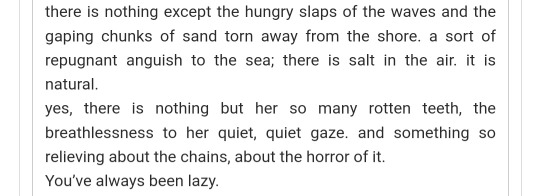
Say no more, fellow of huge brain size. I am on the boat
Fanart wise, I only really have one peeson to recommend, Psicheanima.
They also hold this Makima rp twitter account reviewing movies and talking about everday situations, which like I mentioned I love, Makima slice of life 🫶
And while I'm here, linking my Makima spotify playlist again.
It's very cathartic for me to write about her even when you can never overstate the rot that she is, the aching infected wound, the destructive ruthlessness of her.
I'm aware this post may make me look insane but whatever lol, art can make emotional fools out of all of us and that's precious I think.
#Ask#Makima#Fumi rambles#But yeah for example I have an autistic reading of Yoshida Hirofumi analysis too#No one does the uncanny friendliness quite like asd ppl who've theoretically mastered social cues#it's very existentially terrifying for us. Wdym i'm built to be different and not fit in#Talking out my ass a little but u get me? U get me. Oversharing#All thé csm merch is official except the puke sticker by 118ween and- ah fuck i forgot for the keychain :(
6 notes
·
View notes
Text
I'm calling it now, Donald Trump had a stroke. Hear me out.
So, first of all, Trump did an interview with Elon Musk yesterday on Twitter (or "X", I suppose) where he sounded off. I hadn't heard it until today so I was prepared for it not to be as bad as the chatter, but it was definitely bad. Whenever he got excited it seemed like his mouth filled up with saliva to the point where he sounded like Sylvester the Cat; I half expected to hear him say "thuffering thucotash!" after listening to him for only 30 seconds.
Of course his campaign is trying to blame it on the sound equipment and, while he does sound a trifle muffled, I know a few people who deal with sound equipment (benefits of marrying a music teacher) and none of them think this is something that the equipment could have caused.
So why do I think it's a stroke? Let me explain with a story.
You see, in 2016, I had a discussion with a friend where I argued that we should assume Trump is in debt for more than the value of his assets. You see, at that point he was refusing to release tax returns and financial records to prove that he was actually as rich as he said he was. My point was that, by assuming good things about his finances, he would have no incentive to actually release the documents because anything in them was probably much worse than what we were assuming. By assuming the worst, we provide incentive for him to release them, if only just to prove us wrong.
Now it's eight years later and… boy do we know a lot of bad things about his finances. We know that almost none of his buildings run at a profit and that the only one that does is the one that he doesn't manage (the Vornado partnership). We know that his charity was shut down for being a slush fund that did no actual charitable work, we know that he fraudulently inflates and deflates the values of his properties depending on whether he's talking to a lender or a tax collector, and we know that he falsified his business records to hide illegal payments to aid his political career.
In other words, if we'd assumed the worst in 2016, we'd have been much closer to being correct than if we'd even made a neutral assumption!
So that's why I think Trump had a stroke. It would explain why he suddenly developed a speech impediment (unlike Biden's stutter, this wasn't there four years ago) and why he's been holed up in Mar a Lago for the last month.
If he didn't have a stroke, then let's hear the real explanation for these things. I'm betting I'm much closer to being correct than the people who would brush it off as nothing.
13 notes
·
View notes
Text
I was thinking about the dorm’s spirits and how all the characters embody them (it’s super interesting to me, I might post another analysis about just that sometime) and I noticed something interesting. It kinda seems like characters overblot when they stop embodying the spirit of their dorm properly. And I wanna rant about that. Spoilers for all 7 overblots.
Heartslabyul is meant to embody the spirit of strictness.
Obviously, Riddle is incredibly strict. That’s the whole problem in Book 1. And personality wise, that doesn’t really change. He doesn’t stop wanting to be in control. But after Ace and Deuce challenge him, he loses control over his dorm. Everything turns into chaos. Whether or not he wants strictness and order, he can’t create it anymore.
And then, when he actually overblots, he actively breaks the rules and ignores authority figures. Crowley tells him to calm down and he doesn’t listen. He punishes everyone in the dorm for one person’s actions, even though that’s not real justice. And there’s no way that throughout all of his magic training he didn’t learn that using his signature spell on that many people was a bad idea. But he gets so caught up in ending the chaos that he creates more chaos, and instead of mending the rules, he thinks he can be the only one allowed to break them.
—
Savanaclaw embodies the spirit of persistence.
Leona hadn’t really seen the point in trying, he was seemingly depressed for a while, but he kept going anyways. He kept attending school and tried to cheat his way into winning Spelldrive.
But he overblots when he finally gives up. He gives up on winning the tournament, on helping his classmates, on doing anything with his life. He gives up on everything. He decides to just quit and even calls other people idiots for continuing to try at anything.
—
Azul’s is one of the most interesting to me because I feel like there’s a couple ways to interpret his dorm’s spirit. But, Octavinelle is meant to embody the spirit of benevolence.
Taking that at face value, when he overblots, obviously he isn’t being charitable or kind to others. Previously he really had been giving people at least something in return for whatever they gave up. You could argue he was being charitable. There’s a chance that a long time ago, he really was charitable. But at the point where he overblots he practically starts stealing souls for nothing in return.
Looking at it from a slightly different angle, he isn’t being kind or charitable towards himself. It might seem like he is at first, since again, he’s stealing souls for himself, but the reason he’s doing that isn’t. He isn’t acknowledging his own skill or his own value. He isn’t showing himself any kindness at all, instead saying that he needs to pretend to be someone else because he’s awful. He basically says the same stuff his bullies said to himself. And, when it comes to the money and business aspect, he lost everything with the contracts.
—
Scarabia is meant to embody the spirit of mindfulness.
The reason Jamil’s a good schemer is because of his mindfulness. He keeps track of any harm that could come to himself, his reputation, or others, so he can make a plan with the least risk and so he can create contingencies where he can.
But when he overblots he stops keeping track of everything and focuses only on hurting Kalim. He’s incredibly self destructive at that point. To quote him directly, “Myself, my family, I don’t care about ANY of it anymore!” That isn’t being mindful of anything.
—
Pomefiore is meant to embody the spirit of tenacity. Admittedly, it does kinda just sound like Savanaclaw 2: Determination Boogaloo but they are slightly different.
Vil overblots when he tries to kill Neige because he’s given up on ever winning against him. He decides that no amount of hard work will ever change anything and he can never achieve his goal.
Kalim even points out his sudden change in attitude from, “if we work hard and do everything right our beauty will be greater than anyone else’s,” to “we might as well just kill the competition.” And Vil actually realizes that what he did was the opposite of the tenacity he admires, and ironically, that just creates stronger self loathing and makes him want to give up more.
He ultimately decides that killing everyone on the planet would actually be better than continuing to work towards his goal. Admittedly, trying to kill everyone is its own kind of tenacity, but still. And it was a little unclear if he was actually gonna go through with that. He was maybe just going to kill anyone who saw him.
—
Ignihyde is meant to embody the spirit of… uh… *looks at thesaurus* diligence. Yeah. It’s diligence this time. Not persistence or tenacity. Diligence.
In a more legal sense of the word, Idia fails to be diligent when he decides to open the underworld. Honestly, you could even argue that he fails to be diligent when he fails to stop Ortho from going down there and talking to the phantoms in the first place. It was his responsibility to look after Ortho and to keep the phantoms locked up. But I’m gonna say that the main failure of diligence is when he decided to actively go against his responsibility as director.
In a more personal way, he fails to be diligent by giving up on ever fixing his life. He decides to cause the apocalypse, which might not sound like the easy way out, but I’ve dealt with similar mental health issues as Idia and it often seems like it would be. He doesn’t want to go through the effort of trying to break his curse, or trying to make friends, or trying to find forgiveness, or trying to change his life at all. He decides he’ll either wallow in self pity forever, or try to make his life fully start over, because making things right is too much work.
—
Diasomnia is meant to embody the spirit of nobility. This one is a bit tricky to describe, honestly, but he does stop acting noble before his overblot.
A part of nobility is often being selfless or caring for others in some way, and on the surface it might seem like Malleus is caring for others. He certainly thinks he is. But he’s actually being incredibly selfish. He’s ignoring what other people want, even what Lilia wants, just because he doesn’t want to be left alone. That’s understandable, but ultimately it is a very selfish goal.
Malleus has always been a kind of selfish character, but he does worry about being polite and charitable in specific ways. For example, his concern about invitations, and his desire to use magic to help others, often as thanks for various things but not always.
He’s no longer worried about being polite, or kind, or even ruling his kingdom, if you want to talk about the other meaning of nobility. He’s only concerned with making everyone sleep and never die so he doesn’t have to deal with the pain of being alone.
—
That’s all. Thank you for reading my rant, and if you want to add your own thoughts on this matter, feel free to!
#Persistence tenacity and diligence are all slightly different btw I’m just joking#twisted wonderland#media analysis#disney twst#overblot#A majority of this rant is a few months old but I only finished writing it today. Fun fact
6 notes
·
View notes
Note
Going back through TOH's episodes, it strikes me how boring they are. Part of the problem seems to be how criminally unfunny the show is, generally speaking. I can count how many times I've laughed on one hand. In fact I can list them:
There was the "It's been my dream since I was a boy" guy pushing kids off cliffs (Moving Hassle), Luz's "He'll be fine" after throwing Hunter overboard - and then his subsequent re-entry (Hunting Palismen) - and lastly Luz tumbling offscreen in front of Amity after a spider crawls on her face (Grom). That's 3 scenes, 4 jokes if we're being charitable. And sure, maybe my sense of humour is just incompatible with TOH's and I'm being harsh.
But I can't deny that I just feel like there's no rewatch value in TOH? Like it's just... the jokes are so bad to the point it's not fun, it's not entertaining, it's a slog, I see no value in retreading the same ground. And I am a SERIAL rewatcher! This is coming from someone who spends maybe 85% of their time experiencing the same stories! I love seeing well-done media all over again, because even if I know what's going to happen or what they will say, a well-structured joke or a skillfully delivered line is still gonna engage me.
I can't even recommend the show to anyone because I HAVE in the past... and what ends up happening is they watch the first couple episodes, get bored, go "I recognize that you like this, but it's not my thing" and drop it. And I CAN'T BLAME THAT! Because that's how I reacted too when I got into the show! I only stuck with it because it seemed like it was going really interesting places. And it tried to, I think, and failed.
I'm also a very fandom-heavy person so TOH's boring episodes have made it increasingly harder for me to stay within it. Because I'm not rewatching anything, I can see myself in real time as I forget more and more of the plotlines, and even a lot of the characters. It's just... kind of disappointing. It's like I just had a gradual fizzling out of interest. I don't even hate the show, which might be better in some ways - instead I just can't muster enough shits to feel any type of way towards it.
I rambled a bit but I guess my ultimate ask here was: what are your thoughts on whether or not TOH manages to entertain new/old viewers?
So I like S1. I think the characters are what carry it and that they are at their most interesting, EASILY, in S1.
The vast majority of S1, in terms of concepts and executions for plots, is OKAY AT BEST.
This actually just comes down to a simple tonal decision of TOH and also just the fact that a boring world with boring magic creates little to do with bog standard plots and TOH actually has a LOT of bog standard plotting. It is a pretty classic story structurally and takes genuinely very few risks in the structure... Which is okay in theory.
There is nothing wrong with not reinventing the wheel and TOH talks a big game about subverting tropes but no. As a fantasy fan, I can tell you this is EXCEPTIONALLY normal. Like... Insultingly from how much it talks a big game. Especially because if you're going to do classic, you have three options: Shoot the moon, lean into the unique elements of your concept or do it VERY. VERY. WELL.
And remember: They did a body swap episode and it is one of the most hated episodes of the entire show. That's not a good sign.
But this touches on the second problem I brought up: This is a boring world with boring magic. Because TOH's fantasy world is so basic, has little magic and little flair with its magic, it inherently limits what it can do. Now, it doesn't have to be this way but the show made it this way with how little we see of it, how limited it is (like how plant magic is 99% vines), and how often it just blatantly makes one to one comparisons between it and our world with effectively NOTHING altered like how the covens are just jobs, right down to them being introduced through a job fair and a boring one at that.
So when we look at a classic episode concept like the body swap episode, the three plots are... Easily replicated elsewhere. One person gets in trouble in the swap's job because they don't know what they're doing (with the most unique twist of this actually landing them in prison), a classic animal plot where they're taken in by a place that seems cozy and then isn't with literally no changes, and finally... Teenager pisses off bullies and agrees to jump DEAD MAN'S GORGE! But instead of skateboards and people really building it up, its rat beasts.
None of these plots are actually bad, they're go tos for a reason, but... No one is bringing anything special to this. Luz is entirely ignored so her character may as well not matter, Eda is doing NOTHING to add to her plot and King... King is fun for about two minutes leading the bullies and otherwise is just any other character in this situation. It's not bad, I personally enjoy parts of the episode... But it's nothing special. From the second the thing that X character is going to do is revealed, you can guess every step of the plot and they don't even really throw in good jokes in the process. A couple jokes but nothing memorable because everything is weirdly subdued compared to how other shows would be, even in an episode that is definitely trying to be more over the top.
And this runs into the inherent tonal issue of TOH: It doesn't want to be an adventure comedy. Those are genres that are commonly really over the top. They hear jump the shark and go "How about a shark jumping ten other sharks in order to finish making a can of tuna for their fire giant overlord?" And the face of this fact, in that the genres it pitches itself as for the first two episodes!
TOH flatly refuses to be silly and over the top. It's characters are very... 'realistic'. I don't mean real, just that they're meant to feel more mature by being more in control. They don't let them interrupt each other for a joke, they don't let a character be potentially OOC for a one off gag like Hop Pop screaming "EAT THE RICH!" or Sprig asking "Have you ever killed a a man, Hop Pop," and I can only think of one time Luz got mad for the sake of a joke and honestly, yelling about the Rusty Smidge barely comes across as a joke because of how genuine the anger feels after a point. Otherwise, stuff that would normally get exaggerated frustration or the like to at least let you laugh at the reaction just... doesn't get one, like how Luz yells about Luzura being killed off but then... Just walks off and is passive aggressive mostly instead of even exasperated. For a drama or romance, this is not a bad approach but for even just an adventure kid's show... It's not great to put it mildly because people meet odd situations with weird levels of nonchalance. Not quite irony poisoned levels but getting there.
It's why TOH is mostly remembered for the romance and drama episodes. Not only do they allow some of the romance scenes to actually include melodrama, they also just fit how the characters act better. It's why Amity has some of the biggest emotions of the series and why Lumity have such great lines between each other because they're actually willing to lean into the sort of genre fiction that they're doing. This is also why S2 works better than S1 because a lot of the pretense of being a comedy adventure gets dropped but like... There's still plenty of boring in S2 with stuff like how Elsewhere Elsewhen takes time travel and includes a couple jokes at the beginning and then is just... horribly bland and barely qualifies as an adventure.
This lack of allowing people to be emotional and jokey also leads to the reliance on comic relief characters. People like Gus, King or Hooty, or S2 Lilith, who the characters can mock in someway, including the writers. Characters who can be the punchline even if it means a lot of people come off a lot meaner than they should, i.e. Luz absolutely rejecting Hooty for the vast majority of the series despite supposedly liking the weird and rejected. That also means that most of the time they're not on screen, either the scene starts getting pretty dry or you have a character suddenly warp to be comic relief, like how Eda gets in some S2 episodes like Elsewhere Elsewhen or Eclipse Lake where suddenly she's MUCH more of a joke than she normally is and also REALLY bad at it too and seeming potentially brain dead for it. Thanks to Them even does this to Amity even though she is probably the last person in the cast to make sense as a sudden clutz.
All of this stuff makes it so that if you go in wanting a kid's show, a fantasy show, ANYTHING that is pitched in the first episode... S1 is going to be just okay to you. I enjoyed it... But I also fell off when I first watched it. I thought the characters were good but none of it stuck with me as actually memorable and I watched until I think Adventure in the Elements. I never was never compelled to come back until Lumity animations (literally THE Little Miss Perfect animatic that is nowadays probably hard to find actually) made me go "I remember this show being neat." And Lumity was what kept me, not because I was generally laughing or calling these episodes something special. In fact, that sense of unsatisfaction is probably why I watched through it faster than Amphibia. No one episode of TOH is really great to watch on its own because... It's just kind of boring, or like half of it is boring because the B plots across the board are SO BLAND. S1 or 2 for that matter since Lumity starts getting boring B plots like with the archives or finding out the author of Azura. Both concepts btw that could have been really interesting setups and instead... If you're not into blushing Amity, get FUUUUUCKED.
That's without getting into REPETITION. Repetition kills comedy so King having one joke for S1 and also taking up like half of the B plots for the first ten episodes means you are going to be in agony eventually anytime someone talks to him because you know where it's going and you have DEFINITELY heard this joke before. And you know, he also gets three repetitive B plots which just hurts the joke even more, even as they try to make twists on it, and hurts the feeling that the show is doing... Anything..
It's just not good. Which is probably why once the characters and the 'subversive/unique' elements of the show both weakened, more and more people left because... Why would you keep watching this then? Those elements are what made up for boring plots with boring execution in a world that didn't allow for more interesting storytelling because it had few ideas and expanded on NONE OF THEM. So of course people pitch it using the elements that say "this isn't like other kids shows/fantasy shows" because if you pitch it to people who like those... They'll just be disappointed eventually and bored quickly. Like i think a lot of people did to be quite honest.
And a lack of creativity, and a lack of genre understanding, isn't something time could have ever fixed.
======+++++======
The short version of proving this point btw is going "Compare Bumi's introductory episode, which is a character giving three trials to prove another's worth, versus when the Bat Queen challenges Luz. One is exceptionally funny, interesting and has genuinely interesting twists while the other is... There. So very there. Painfully just... there. Not even bad, just... There.
Also, yes, comedy is extremely subjective which is why I tried to talk more about how a lot of these premises are boring because that can be a bit more objective.
I have a public Discord for any and all who want to join!
I also have an Amazon page for all of my original works in various forms of character focused romances from cute, teenage romance to erotica series of my past.
I have an Ao3 for my fanfiction projects as well if that catches your fancy instead.
If you want to hang out with me, I stream from time to time and love to chat with chat.
A Twitter you can follow too
And a Kofi if you like what I do and want to help out with the fact that disability doesn’t pay much.
38 notes
·
View notes
Link
#absurddatingtips#coffeeshopflirting#creepymeninpublic#datingcoachsatire#fakedatingevidence#Men’sJournalsatire#observationaldatinghumor#parodyofdatingexperts#qualitywomen#satireondatingapps#satiricaldatingadvice#socialcommentaryhumor#volunteerdating#wheretomeetwomen#yogapickuplines
1 note
·
View note
Text
Let’s Talk About: Starseeds
Ohhh I have so many thoughts. Mostly, I used to write views pieces every week in college and I really enjoyed having a public written forum to express my frustrations and thoughts. I don’t have all the answers on this topic, but maybe this opens up a dialogue we can all grow from.
First, what the heck is a starseed?
The concept of starseeds are rooted in the thought that there are different soul races or more like origin points and that embues the soul with certain advantages in certain areas, like technology for example. I sort of think of this as like soul expertises and certain groups have certain more innate skills.
The idea is that earth is on a trajectory for self-destruction and that other groups are trying to help earth evolve. These other races or soul have charitably infiltrated earth as a way to help it evolve.
These starseeds incarnate as earth humans to help teach lessons about unconditional love—something humanity struggles with— and the way society could be—think less capitalism, more secured housing and being able to do with your time whatever inspires you because you are given what you need. Different soul origins have different specialties, not all other places are benevolent. Some other places don’t value emotion the same as others. It’s just differences.
So what’s the big deal?
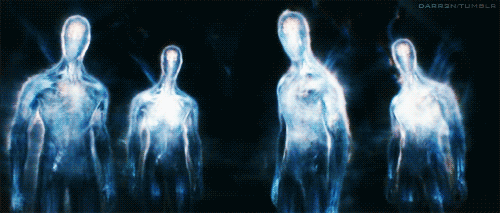
I struggle with the starseed concept because I feel like creating groups creates exclusion. Maybe it’s hard for me as a human to think differently, but I feel like if there were races and other labels based on inherent differences in soul fabric, it would create this idea of division rather than unity.
It’s hard for me to see soul ages or hierarchies of any kind in the energetic world because that’s not how they communicate and organize group structures. So many spiritual teachers say that certain souls are considered grand masters, and older souls are wiser, certain souls are special or this rare thing. It’s all ego stroking to feel special.
They don’t organize souls by races or by gender or any of these human labels. I think people apply human labels because they can only conceive of things through human understanding. That’s why I struggle for words sometimes because the thought itself is outside the realm of humanity.
The way I can explain it is they see things as just purely differences. There’s nothing attached to it. It’s like every element of all these energies are needed to make a full picture. You’re pink. I’m blue. Because both colors are needed equally. Full acceptance of what you are.
Spirituality as a means to uphold the capitalistic patriarchal status quo:
I struggle with how the spiritual community upholds so many gender stereotypes through the perpetuation of male and female energies. I prefer to say assertive and receptive energies, knowing when to push or pull. Because assigning certain traits as masculine or feminine is upholding a capitalistic economic system that encourages certain traits in men because they are useful for labor and certain traits in women because it’s useful for childrearing.
And yes, I believe anything connected to gender or sex is ultimately a direct reflection of the patriarchy and what it imposes on us all. So in order to truly free our LGBTQIAP+ family and friends, we have to abolish the patriarchy. It is the ideology that uphold men as superior to women.
Why are MTF individuals highly targeted, because to step down from a position of power is so confusing and upsetting on a subconscious level for many men. This is deeply ingrained patriarchal poisoning. The same poisoning that had women voting for Trump. We have to truly become equals to end the patriarchal system and that only happens when people understand each other on a very deep level.
How is it capitalistic?
Glad you asked! The concepts around starseeds are still steeped in capitalistic spirituality, the form that also produces scammy gurus. So many people use this idea and concept to prey on vulnerable people and make money. When more people buy into a trend it creates a larger energy imprint because more collective people are thinking about the same thing. That’s why I don’t like to use the term twin flame, the toxic collective thoughts around the term.
This idea of starseeds still envisions a world of cities, people focused on technology, all HUMAN things. Do you see what I’m saying about the mind being limited? We cannot conceive of how else it may be because we only know this experience of ourselves through our humanity. I have memories of being able to do other things, but I believe those skills used to be more easy to do on earth. It’s heavier here now and the energy doesn’t support it. Like bending elements.
This world still has governing bodies, it envisions a more utopian version of the capitalistic world we already have. They envision these races upholding diplomacy and how some places are bad and others are good. And this is the capitalistic colonizer mindset! This group of souls is low vibe and evil and this group is high vibe and benevolent. That’s why I try not to talk about lower energies negatively. That energy is needed as part of the full mural of existence. To label one as lesser or less desirable, it’s not how it is. They are just different.
The issue at the moment is that the balance is uneven on earth, too many lower vibratory energies are being supported here because of all the destruction to the earth (thriving plants help absorb so many of those lower vibes). That’s why we’re all here to “raise the vibration” To try to rebalance the planet before it falls off the table.
And the idea of starseeds is sort of racist:
There are certain “good races” like the Pleiadeans who are known to have Nordic features, while certain “bad races” or “low vibe” races like the reptilians (which is actually anti-Semitic), are displayed as less colorful—grey or black, dark colors. I feel like I don’t have time explain that that also mirrors currently valued physical features which are again, human understood features. The having to go through mind to translate is so fucking hard y’all!
In conclusion:
The idea of starseeds is challenging for me because I feel so vastly that there are other places we experience other humanoid experiences and some of us do prefer other places over others. I’ve said before I’m not a huge earth fan. But so much of the modern spiritual concepts people perpetuate, since it’s almost a collectively held thought now, are rooted in racism and capitalism and sexism and things I just fucking hate about humanity!
So while I see myself reflected in qualities of the races of starseeds I’ve read about, and while I feel like some of the ways the other planets are described feels familiar, I also can use my discernment to say, some of that doesn’t resonate with me or make sense so I discard it. I find learning about starseeds is helpful just like learning about astrology is helpful. They are all tools for self understanding.
But it’s also important to call out things that perpetuate systems of oppression. Because that’s the exact shit we’re trying to liberate from.
#long post#starseeds#starseed#pleiadian#pleiades#the arcturians#arcturian#sirian starseed#patriarchy#capitalist bullshit#anti capitalist#capitalist system#capitalism is a curse#capitalism isn’t working#capitalist hell#capitalism#capitalist greed#capitalist society#capitalist dystopia#capitalistic hellscape#feminist#feminism#spiritual gurus#true guru#guru#spiritual guru#gurus#twin flame#soul journey#soul evolution
14 notes
·
View notes
Text
Super Robot Rollcall: The Nadesico Crew of The Past
Yurika Misumaru

"You can't tell people fighting on the frontlines, people who don't know if they'll even return alive, that they don't have the right to know anything!"
Source Material: Martian Successor Nadesico Age: 20 Height: 166 cm Hobbies: Jigsaw puzzles, singing Favorite Food: Anything sweet Voice Actress: Houko Kuwashima Character Designer: Keiji Gotoh
Yurika Misumaru is the seemingly airheaded captain of the Nadesico. Between her difficulties adhering to social norms and her fervent affections for Akito, it's easy to think that's all there is to her, but in truth, she's a combat genius, and passed military academy with frightening scores. When everyone's back is to the wall, she's liable to make up for her lack of experience with her tactical gifts to create miracles.
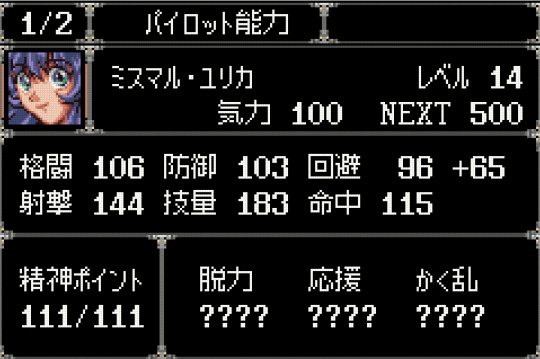
Much like with Noin, her stats do not reflect her canonical skills, being painfully middling even for battleship captain standards. SRW R hates to see a girlboss winning.
Her spirit commands are fairly decent, however, with a lot of fringe support utility that you won't find in many other learnsets, which is especially handy to have on a unit that's gonna be forcibly deployed most of the time.
Fun Fact: She has a near photographic memory, and seems to have a knack for linguistics.
Nadesico
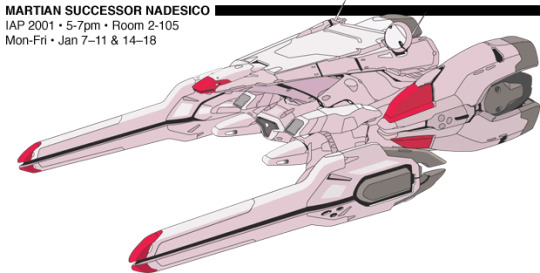
Source Material: Martian Successor Nadesico Length: 300 meters Power Source: 2 Phase Shift Engines, 4 Nuclear Pulse Engines Real World Designer: Rei Nakahara
A civilian battleship designed by Nergal which far outclassed anything the Earth military had in their possession at the time. This fact, coupled with the fact that it was heading for Mars for a seemingly suicidal rescue mission while the Earth Sphere was embroiled in the bloody Lizard War created a lot of enmity between Nergal and the military, leading to a lot of the conflicts early into the story.

It's the Nadesico B if it had missiles (meaning it's not completely EN dependent). I don't know what you want me to say here, it certainly is a battleship.
...If i'm gonna be a bit more charitable, it is fairly funny that when you think about it, this thing is a straight upgrade over the B, which is meant to be a successor to this thing.
Fun Fact: The Nadesico is an amalgamation of quite possibly the three most iconic space battleships in japanese sci-fi nerd culture at the time the show came out; its large, flat upper hull is reminiscent of Star Trek's Enterprise, the protuding "legs" are a homage to Mobile Suit Gundam's White Base, and the Gravity Cannon is obviously evocative of the Yamato's Wave Motion Gun, to say nothing of how the two names combined form Yamato Nadeshiko, a name emblematic of the idealized "japanese beauty".
youtube
Akito Tenkawa
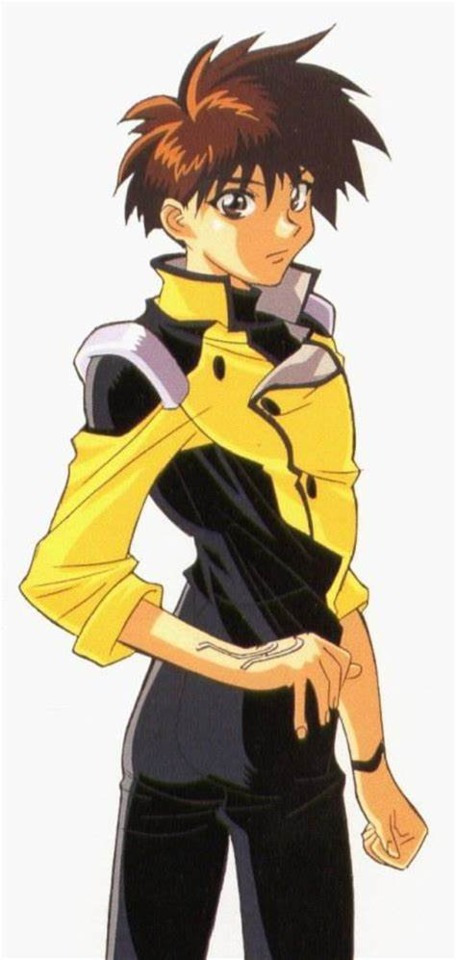
"I finally watched the last episode of Gekiganger V."
Source Material: Martian Successor Nadesico Age: 18 Height: 175 cm Favorite Food: Earth cuisine Voice Actor: Yuuji Ueda Character Designer: Keiji Gotoh
A cook who felt completely aimless in life. He lost his previous life on Mars, he lost his job due to his PTSD from his experiences with the Jovian Lizards' assaults on Mars, and through a series of convoluted circumstances, he ended up landing a cooking job on the Nadesico... only to be further roped into being a pilot as well.
Throughout it all, the few things anchoring him were Gai, Gekiganger, and Yurika. His struggles to balance these influences on him with his dreams, ideals and values are the crux of the story of Nadesico. He loses sight of himself multiple times, but in the end, he manages to come out of it with a better understanding of both himself and the things he holds dear.
He pilots the pink Aestivalis unit.
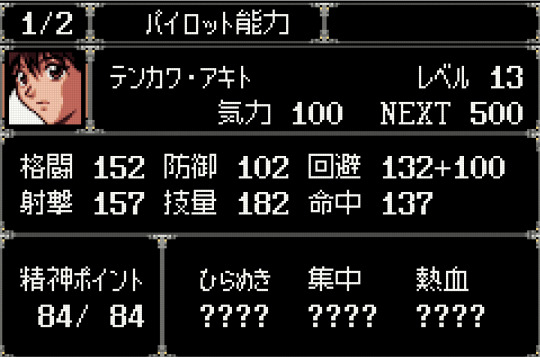
Akito and Gai are very much a set. Akito has a more Real-oriented spirit learnset, better Evasion and worse Defense, but better Ranged... sadly, since the aforementioned Double Gekigan Flare is gonna consistently be his best move, it's easy to consider Akito to be a simple add-on to Gai, and he doesn't really feel like a protagonist for much of the game.
Even so, as the game progresses, he'll get a few ways to differentiate his playstyle, and by the end, both him and Gai will be a lot more interesting... though ultimately, you'll still realistically need Gai (who can actually draw out the full power of the DGF thanks to his higher Melee stat) if you want to use Akito to his fullest. It's easy to joke then that Gai is the real protagonist of Nadesico in this game, but in my opinion, we haven't yet encountered the character who truly takes up the mantle of Nadesico protagonist in SRW R...
Ryoko Subaru
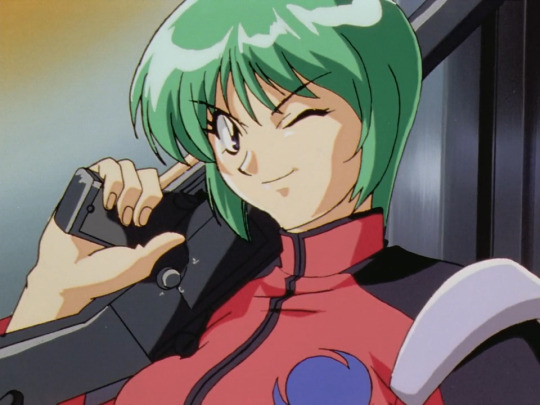
"Did i just find it...? My own evening star..."
Source Material: Martian Successor Nadesico Age: 18 Height: 165 cm Hobbies: Basketball, motorcycles Voice Actress: Chisa Yokoyama Character Designer: Keiji Gotoh
Daughter of a military man, Ryoko is a confident pilot with the skills to back it up, but she struggles with social situations, and can find it hard to act formal.
She's the leader of the trio consisting of her, Hikaru and Izumi (often called the Buttercup trio, as the Aestivalis is named after the Adonis aestivalis, a member of the buttercup family).
She pilots the red Aestivalis unit.
she's also really cute
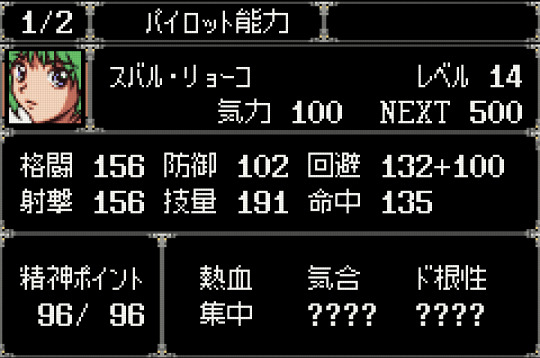
Gameplaywise, Ryoko is like a midway point between Akito and Gai. Her Melee and Ranged stats are perfectly balanced, and her defensive stats are on par with Akito's, but she has the upper hand in the Skill department. The biggest issue with her though is that much like Akito and Gai have their combination move, she and the other two girls have a combination move... which primarily uses the Ranged stat. As such, you'd really want for her to have higher Ranged, rather than the balanced loadout she has here, which seems to be an attempt to make her better on her own than the other two, but just isn't impactful enough when Aestis are so underwhelming without their combination partners.
Still, she's far from a bad pilot; you just wouldn't really want to deploy her without her two squadmates.
Fun Fact: This is less of a "factual" one and more an experience report, but. I went with her route in the first Nadesico Sega Saturn game because of course i did, which has a mechanic where you can take the girls out on dates to the Nadesico's holodeck and live out a little romantic fantasy scenario. But for some reason, Ryoko seems to have glitched for me, and every single time that she initiated a date, without fail, she'd pick the castaway scenario, over and over and over again.
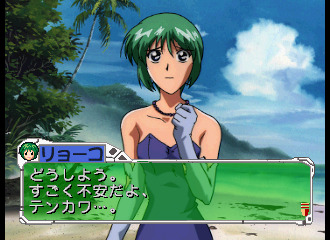
maybe she just really liked The Blue Lagoon
Hikaru Amano
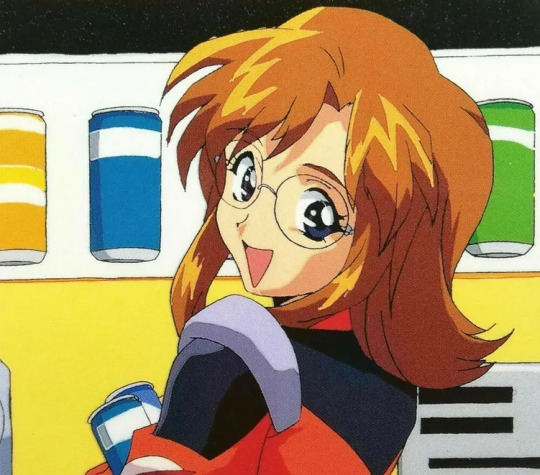
"I learned the hard way that hobbies and romance don't mix..."
Source Material: Martian Successor Nadesico Age: 18 Height: 152 cm Favorite Food: Pizza crust Voice Actress: Shiho Kikuchi Character Designer: Keiji Gotoh
A quirky girl who's really into anime and manga, being a fan of Gekiganger herself (though never really talking about it much with Akito nor Gai). She's a doujinshi artist and writer (remember, doujinshi here just means fanwork), who plans to break into professionally making manga.
She easily falls for 2D men, is a bit of a fujoshi, and seems to have gone through a bad breakup not too long before the show began.
She pilots the Yellow Aestivalis unit.

In terms of raw stats, Hikaru's a really good Aesti pilot. Her spirit commands, while not amazing, are also more than serviceable. If i had a complaint, it's that like Ryoko, she really needs the other two to function, and even moreso than Ryoko, as her second strongest move, the Distortion Punch, is Melee-based. But if you're deploying all three, she's rather powerful.
Izumi Maki
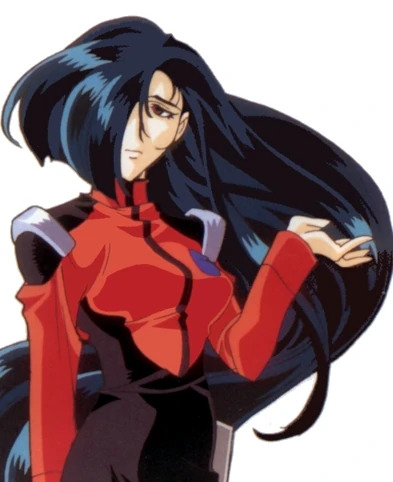
"I'm a woman who only causes misfortune..."
Source Material: Martian Successor Nadesico Age: 18 Height: 177 cm Favorite Food: Botamochi, inari sushi Hobby: Bad puns Voice Actress: Miki Nagasawa Character Designer: Keiji Gotoh
A patented Weird Girl, she's a gloomy-looking young woman of few words. Usually, she only ever speaks up to make a terrible pun related to something that was just said, but she's not just gloomy-looking; she seems to have had quite the unlucky past, though she doesn't outwardly dwell on it very often.
She pilots the Turquoise Aestivalis unit.
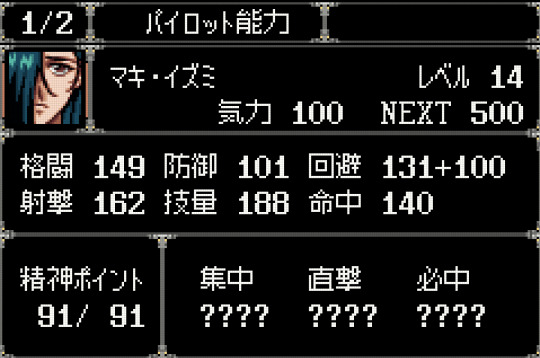
Much like with Hikaru, Izumi is clearly meant to be deployed as a set with the other two. Only real notable difference to point out here is that Izumi has slightly better offensive stats and slightly worse defensive ones than Ryoko.
Fun fact: The second Sega Saturn Nadesico game (The Blank of 3 Years) reveals that Izumi enjoys... dressing in a ninja costume and jumping around in the woods in the middle of the night. Just for fun.

yeah sure why not
Aestivalis

Source: Martian Successor Nadesico Height: 8 meters Power Source: Gravity Wave Antenna, backup generator Real World Designer: Mika Akitaka
A modular machine made by Nergal, made to work in conjunction with its line of battleships. Thanks to cooperation between the machine and its mothership, the weight of a dedicated generator doesn't need to be taken into account, and Aestivalis units are capable of formidable versatility thanks to their various frames.
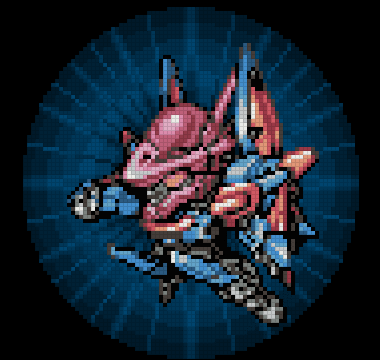
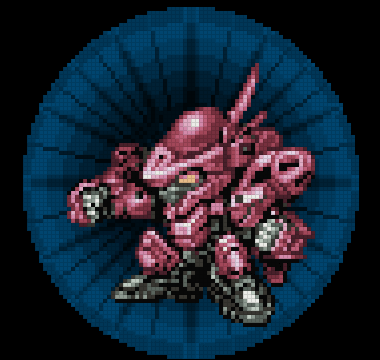
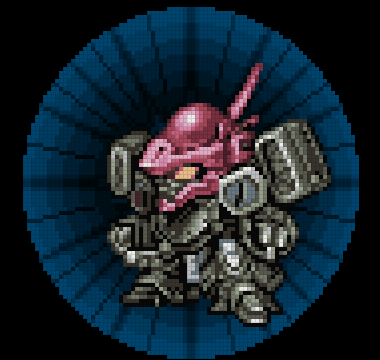
If you're coming from other games, you basically get the gist of how Aestis work. Pretty good survivability, pretty underwhelming firepower unless they can fire off their combination moves.
Of note, however, is the Artillery Frame, which i feel is particularly strong in this game; though its Mobility and Movement Range are just as bad as always, and it has no post-movement attacks, it manages to make up for it with decent firepower, and perhaps more importantly, there are a lot of maps in this game where you can get away with turtling on base tiles. It's also a tempting way to use Hikaru and Izumi's high Ranged stats without having to deploy all three of them, but don't get too used to that; you won't actually get to keep these to the end of the game. Not as they are right now, anyway.
Another thing of note is the lack of a Ground Frame; as a result, against land-based opponents, Aestis will really struggle to deal damage unless you're using the Artillery frames.
Fun fact: In flower language, the Adonis aestivalis can stand for bittersweet or unforgettable memories.
youtube
2 notes
·
View notes
Text
unstructured tired ramble
on the topic of AI generated art, i often find people making bad criticisms.
i frequently see in conversations the criticism that AI art is bad because it looks bad. because it doesn't do anatomy correctly. because it gives extra fingers and doesn't understand backgrounds, or makes nonsensical images. AI art is not bad for these reasons. if a human drew something identical to an AI generated image, extra fingers and strange sheen all included, i would be interested. because this artist had reason for these details, even if those reasons were as trivial as "well i thought it contributed to an aesthetic i'm going for".
AI art is bad because art is identity. art is communication. art is intention and the delivery of information from a conscious mind to a tangible creation. i choose the words i write with intent. a musician chooses their notes with intent. a painter strokes their brush with intent. i believe that intent and communication of a conscious experience is what infuses an image, some words on a page, or a series of sounds with the essence of art, and the ways we can apply them to our lives is what gives them meaning.
i can be even more charitable and assume this art is in a socialist utopia where no artist is replaced for profit, nobody's work is stolen, and no artist's livelihood is threatened because of it. i'm talking only about the experience and value of the art itself.
i think we have an inherent bias toward things that have conscious meaning and experience. if my dog was replaced with an exact copy that had no consciousness but looked identical and could mimic my dog's behavior identically to a tee, i would find no meaning in my pet anymore. because i don't have meaningful emotional interactions with something that is fundamentally incapable of those interactions. there is no companionship. it would be a glorified decoration.
most of the art i see derided in art industries such as video games and movies are ones that are lacking intent and communication. cash grab slop churned out by marvel or disney that have nothing to say. we perceive them as lacking in value because the value we find is derived from what we are communicated. a desire for the profit that will be reaped from these products is a cynical intent that we don't wish to see. a level of communication has been ripped from these titles because the art is insincere. we do not feel spoken to, we feel patronized.
AI art goes a step beyond, and rips even the slightest bit of sincerity that those large cynical projects have. the little bits of themselves that the writers and visual artists put into making the overall project, working within the boundaries that they're given by those running the project. there is no "why". because a machine is incapable of "why". it is because it is, and nothing else.
maybe i'm being pretentious here but the value i find in art is the way it can speak and touch. all of my favorite pieces of art are ones that made me feel understood, like omori or celeste; ones that communicate complex emotions in a masterful way; like requiem for a dream, pathologic, or outer wilds; and ones that meaningfully comment on social tendencies and political concepts, like breaking bad, nier: automata, and disco elysium. all of these works speak. a machine cannot speak. a machine can make noise, but that noise does not communicate.
it's genuinely saddening to me to see people internalize the transformation of art into a product to be consumed that capitalism has cultivated. you don't need to have the same perspective as me, i'm no expert. i don't have a degree. i think everyone's experience with and view of art is different and i don't want to come across like i think everyone should think the same as me. but a view of art that is totally surface-level and defined entirely by its shallow entertainment value is, i think, destructive.
sorry this is structured like a ramble and i'm sure i could write something better if i really sat down for a while, but i think i got my general point across. i love art, and i don't want to deride anyone for the way they experience it. i don't want anyone else to enjoy art less. on the contrary, i want everyone to have an enriching experience with art in their own way. i believe that randomly-generated pieces that remove the human element of art are unable to be enriching in the same way.
i think this stretches beyond appreciation of art and reaches into the fundamental ways we interact with the world and other people. it's a harrowing and alienating idea to imagine a world where you can look at a sea of art, words, and music, and not know whether or not anybody is on the other side. some say all art is political, i guess i'm saying the concept of art itself, or lack thereof, is political.
0 notes
Text
I read this story where this child always noticed that their neighbors would request something from their mother from time to time maybe it will would be milk or cream, or it would meat or poultry and in in return every so often the child’s mother would request something from them but it was always something like salt or pepper. When the child asks why does our neighbor ask for stuff the mother said sometimes people cannot afford certain things and it our job as neighbors to help, the reason I ask them for pepper or salt is because it is inexpensive I want our neighbors to feel like they are wanted and needed as well. Although my reiteration of the story is not quite as beautiful as it was read when I first saw the story. It is safe to say the story is simple and sweet. People want to feel they are needed, loved and appreciated. This is such a small ask of anyone. Help Thy Neighbor, it is not just words to those that live at our side our neighbors is each person that passes by. The item you give your neighbor out in the world could be maybe your last 5 dollars or even a slice of pizza. It’s a small gesture that means nothing to you, but means the world to the person. You are giving them what they can not provide for them selves. A since of love, nourishment. Your act of kindness just let them know that there is a person in the world that values their existence. To spend our lives doing acts of kindness, being charitable. Maybe it is small acts of kindness and charity that lead to saintly hood. I don’t know, I have never met a saint. Speaking for myself, I am no saint. Like anyone else in this world I have lived life. I partied, when through that stage of life where it was nothing but one night stands and moments in my life where the mere thought of a possible child was in the air. The only way to live life is to experience it. Road I took may not be the one you want to take. But looking back I wish I would have slowed down not have been that guy that is so quick to grow up. Instead of being a wreck less child I wish I would have taken the time to live some what righteously and spend time valuing and caring for those that were around me. Some people may refer to me as a dreamer, They may be right. This I do know every time I walk out my door and I walk the streets of my hometown, I see homeless people, people that are hurt, in pain and feeding their addiction to either drugs or alcohol to numb their pain because they’re hurt. Each night they curl up into a store front walk way, wear the same dirty clothes, cover up to keep warm with the same dirty blanket to wake up each morning to see their reflection in the window, reminding them they are at their lowest, so they talk to themselves, they lie to themselves, they lie to the world to justify the craziness of the life in which their living to give them peace of mind. People depend on our genuine appreciation for them, our acts of kindness. For those that took the time to read this post, I thank you.
2 notes
·
View notes